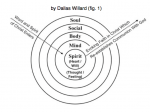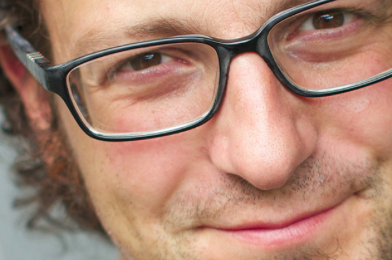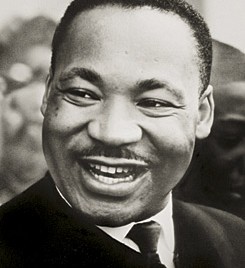I was a sweaty, nervous wreck on my first periscope.
It’s comical…did anyone ever see Broadcast News (the movie)?
I needed two tissues for my sympathetic nervous system.
(Some technical difficulties threw me just before broadcast and I talked SO VERY fast.)
If you didn’t get to see it here you go!
(Twitter pulled the plug on this feature – sorry everyone)
NOTES:
THE #1 Myth about the SOUL…
is that we have one.
But first….we should get on the same page…
WHAT IS A SOUL?
(what are we talking about?)
This is how I’m describing it:
Titanic-style…
In the Old Testament the Hebrew word for soul is nephesh. We might use it this way, “1,517 souls were lost in the Titanic disaster.”
SOUL ≠ dead BUGS BUNNY …like a floating ghost and that sort of stuff.
Not a faint rendering of bugs bunny leaving his body to play a harp on a cloud with Porky Pig. Not something that is ghosty and haunting a house or helping Demi Moore on a Pottery Wheel. (Patrick Swayze-style..google it, young people.)
Ancients thought of the mind and heart differently (the will and the emotions)…
Maybe these verses come to mind…but you’ve been thinking about them in your own context instead of the ancient context from which they were written.
Remember this one?
The heart is deceitful and wicked above all things JER 17:9
(Guard your heart for it is the wellspring of life)
Above all else, guard your heart, for everything you do flows from it.
….The writers of these scriptures were not talking about emotions and feelings when they said “heart” (like we associate the heart today…they were talking about the HEART as one’s will and control center of a person…(the thing we now associate with the mind.)
For them, the emotions (the heart for us in our context) were associated, instead, with the bowels. Perhaps a bit gross..but there is some
MEDICAL TRUTH/correlation : anxiety and stress are closely associated with disease and problem that happen in the intestines…like….ulcerated colon, Irritable Bowel Syndrome (bloating, constipation, gas, and other fun things), digestion issues, food sensitivities and problems in that part of the body. These are extremely related to one’s emotions and levels of stress.
The GEM MODEL of the Soul (my version)
Think of the SOUL as a gem and the facets are ways to see the soul.
You can go as far as saying other things beyond these are facets:
family of origin, social economic situation, skin color (if that has been a defining factor in your life)
education, the country you live in,
Even Christianity is a facet. A worldview is a facet that we can gain a kind of look at who we are.
Grace is central to Christianity, for instance. We can look at our soul through the facet of grace.
When light is added to a stone you can see its flaws and imperfections and you can see its quality (color, cut, clarity, caret)
UGLY soul? Is that possible? what do you think?
In his book Care of Souls, David Benner writes, “We can define soul care as the support and restoration of the well-being of persons in their depth and totality, with particular concern for their inner life. Soul care is done in the context of community.”
The vantage point of Soul Care views struggle or failings not as fatal flaws or illness to be “cured”. Not therapy or self-help.
It’s a sustaining endeavor for our interior lives and our relationships, like water and food is for the body. Incidentally, caring for the body falls within the bounds of Soul Care.
Ten Signs that You Need the Renewal of Soul Care
1. Fruitlessness. Are there observable deficits in the enacted your Fruit of the Spirit? That means, is there any lack or slack in the
areas of love, joy, peace, patience, goodness, kindness, gentleness, and self-control? (If not, I think E.T. went home without you. Phone again. You might want to text, and retweet as well.)
2. You find yourself perceiving things others say as personally offensive, or as direct attacks.
3. You are “venting” more in person or online.
4. You feel unloved.
5.You feel increased frustration, restlessness, or desolation.
6.Your fears and anxiety are more prevalent.
7.You have increased tension in relationships.
8. You struggle with one or more of the “seven deadly
sins”: wrath, greed, sloth, pride, lust, envy, and gluttony.
9. You have problems sleeping or bad dreams.
10. You’re in a creative slump.
RECAP:
THE #1 myth about the soul is that…. you have one. You don’t have a soul you are a Soul. You have a body. George MacDonald, in 1892 (C.S. Lewis quotes him and the quote is mistakenly attributed to him sometimes)
Think of the Soul as “the real you” the essence of you. contained in a body, yes, but made up of everything about you in a pure sense.
Some might say the soul gets extinguished or goes to paradise or gets absorbed into the great Life Force (God) …but in terms of what you need…you always need Soul Care, because you are a soul and that include both the visible and the invisible.
All this more and much more is available in my book. Shame-filled plug.










